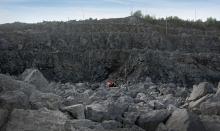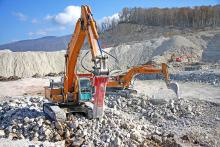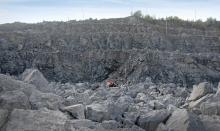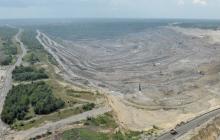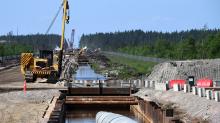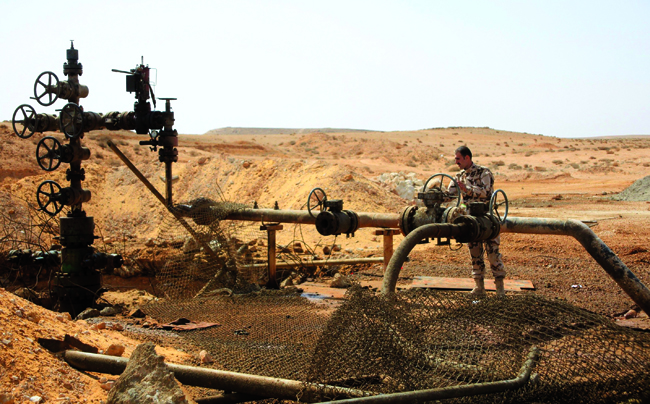
Leading Russian businessmen are keen on opening huge aggregates production sites in civil war-ravaged Syria, Eugene Gerden reports.
Prominent Russian businessmen see great potential in the Syrian aggregates sector. According to the Russian government’s press service and the Russian Union of Industrialists and Entrepreneurs, a public association which unites representatives of leading Russian businesses, a number are keen on establishing large-scale aggregates processing facilities in the country, facilities that can greatly boost supplies of vital building materials to the Russian market, some EU countries, and the markets of new infrastructure-hungry Middle Eastern states.
Such is the keenness of the entrepreneurs that large-scale, Russian-funded aggregates production might start as early as this autumn in Syria’s As-Swaida’a province. Prior to the start of the civil war, the province was a major hub within Syria’s aggregates industry.
Gennady Timchenko, Igor Chaika and Arkady Rotenberg are among a growing number of leading Russian industrialists expressing interest in starting aggregates production in Syria. Almost all of them are reportedly affiliated with the Russian government and the country’s president, Vladimir Putin.
An aggregates production agreement between Rotenberg’s engineering construction company, Stroygazmontazh (SGM Group), and the Syrian government was reached back in 2016. Its implementation began only recently after the final withdrawal of Islamic State (IS) from most of Syria and the end of active fighting between the pro-government troops and rebels.
SGM Group has already started preparations for the development of aggregates fields in the As-Swaida’a region and plans to begin full-scale production before the end of 2018.
According to some SGM Group sources and the Russian government, an estimated US$350 million is being poured into the Syrian aggregates production venture. Most of this funding will come from Rotenberg and his business associates, with the remainder coming from leading Russian state-owned banks in the form of loans. Details of a final funding scheme will be announced later this year.
A spokesman for the General Directorate of Geology and Mineral Resources of Syria said SGM Group had received all the required Syrian government permissions for the implementation of its aggregates operation in the country.
In the meantime, in addition to starting aggregates production in the As-Swaida’a region, Rotenberg may also consider operating on other large aggregates fields in Syria, particularly those which are located close to the historical city of Palmyra, recaptured a year ago by the Syrian army from IS with the help of Russian troops.
At the initial stage production volumes will amount to about 1.5 million tonnes of various aggregates/year, with the possibility of further expansion in due course.
A spokesperson for Rotenberg said the majority of SGM Group aggregates production will be exported, while the remainder will supply the local Syrian market, especially works to restore civil war-ravaged infrastructure.
The spokesperson added: “In order to ensure regular shipments of aggregates from As-Swaida’a, SGM Group is ready to invest an additional US$100 million in the building of new railways and other relevant infrastructure close to major [aggregates] producing fields.”
The production of aggregates in As-Swaida’a and most other major aggregates-producing regions in Syria was suspended in 2015, after the capture of large swathes of the country by IS and rebels. However, the expulsion of terrorists from
the territory provided an opportunity for the relaunch of production at existing aggregates fields.
According to Rotenberg and SGM Group’s export plans, aggregates will be shipped through the Syrian port of Tartus, with their safe passage to Russia and some EU and Middle Eastern nations ensured by Russian troops.
Prior to its civil war, Syria was among the largest producers and exporters of aggregates in the entire Middle East. IS’s invasion resulted in the suspension of all the country’s aggregates mining activities.
SGM Group has already received the equipment it needs to deliver Rotenberg’s aggregates project. The bulk of it was delivered to Syria on Russian warships.
In the case of the As-Swaida’a aggregates mines, according to initial plans of the Syrian government, the contract for their development should have been granted to Iran - a strategic ally of Syria and Russia in the region. In January 2017 the Syrian government had even signed a memorandum of understanding on cooperation with Iran. However, due to economic and political factors, a final agreement between the Syrian and Iranian regimes never materialised, enabling a contract to be granted to Russian businesses.
According to estimates by experts at the Russian Ministry of Industry and Trade, a Russian state agency that will supervise the production of aggregates in the country, total production at the As-Swaida’a aggregates fields could be in the range of 3.8-4 million tonnes/year. The bulk of production will focus on securing quality sand and crushed stone products.
In the long-term, SGM Group and other Russian producers hope to increase the production of aggregates in Syria up to 10 million tonnes/year, of which about 5-6 million tonnes will be for export markets. This will partly be achieved through the opening of other mines located in other parts of the country.
According to some unofficial Russian government data, the total explored aggregates reserves in Syria are currently estimated at 3 billion tonnes. More exact figures are expected to be revealed later this year following the conclusion of exploration works at the country’s major aggregates fields.
In the meantime, Sergey Shirokov, a senior expert at the department of mining at Moscow State Mining University, one of Russia’s leading scientific institutions in the field of mining, said implementation of SGM Group’s As-Swaida’a aggregates production project may require significantly more funds than initially earmarked by Rotenberg, due to the high costs of rebuilding necessary Syrian infrastructure, most of which has been destroyed by the civil war.
SGM Group has been operating in Syria since 2014. Currently, the company operates a gas processing plant and a gas pipeline in the country and has plans to use their capacities during its development of local aggregates fields.
There is also the possibility that the company’s project will be implemented in cooperation with some other global producers of aggregates and construction materials.
According to some Russian media reports, many major Western aggregates companies are interested in resuming operations in Syria after an eight-year pause. However, they are said to acknowledge that the implementation of their plans will be practically impossible without the help of Russia and the participation of large Russian businesses.
Among key Western players looking afresh at Syrian aggregates production is said to be Franco-Swiss global building materials giant LafargeHolcim. The group has long experience of operating in Syria prior to the beginning of the civil war.

